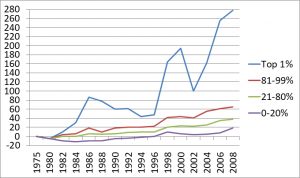Last Friday on an early, Way To Early, news show there was a piece about how manufacturers were resizing products to compensate for rising production costs rather than raising prices and lose customers. It has a term: ‘shrink-flation’. Demonstrated were toilet paper, potato chips and ice cream, which had fewer sheets, less weight and smaller capacity respectively. Shoppers have been taught to read labels for health reasons; now they must school themselves on size by learning how many grams in a quart or a pound and beware of count in artificial sugar packets; the price doesn’t change.
– – – –
Turning to a more sociological vein, everyone agrees the United States is having an identity crisis. It is difficult to know how to handle the situation. For the common citizen, it seems only to be a mish-mash of conflict and pointing fingers. The citizen truly is in the depths of the trenches and even trenches within trenches. How does a citizen gain perspective so that reasonable evaluation can be made?
Learn some facts. Mariner knows this is a tall order for the electorate but if a rational path to recovery is to be available, one must check history for similar situations. Sorry, electorate.
In place of buying textbooks, use Wikipedia to collect information – and make a donation while you’re at it. Search for information on the cause of the French Revolution, the Magna Carta, the Luddite rebellion and the rise of Nazi government (including persecution of Jews) in Germany. Clues for why there were national identity issues may involve financial security of the masses, oppression, racism, power wars and concentration of wealth.
For starters find something in these events comparable to wage freezes for forty years; find something that represents too much cash for the well-to-do; find something that erased major chunks of job availability; find something where power blocks competed too much for the good of the nation. Once historical information has been gained, how were these issues resolved?
Vote accordingly.
Ancient Mariner

 defies elimination. It still is a killing pest in the lawns but in some garden beds mariner has decided to experiment with Creeping Charlie as the ground cover to keep other weeds out and at the same time add to the décor of the garden. It turns out that Charlie has taken hold of his new job with relish. Not even the dreaded crabgrass can sprout beneath a robust covering of Creeping Charlie. In fact, mariner is saving money because he doesn’t have to buy mulch for those areas.
defies elimination. It still is a killing pest in the lawns but in some garden beds mariner has decided to experiment with Creeping Charlie as the ground cover to keep other weeds out and at the same time add to the décor of the garden. It turns out that Charlie has taken hold of his new job with relish. Not even the dreaded crabgrass can sprout beneath a robust covering of Creeping Charlie. In fact, mariner is saving money because he doesn’t have to buy mulch for those areas. otherwise he has let the mole venture about. Tolerance by the mariner is an experiment to see how many Japanese beetle grubs can be eaten; mariner has many fruit and ornamental trees on a property surrounded on all sides by large concrete pads and accompanying large garages. All beetles come to mariner’s garden.
otherwise he has let the mole venture about. Tolerance by the mariner is an experiment to see how many Japanese beetle grubs can be eaten; mariner has many fruit and ornamental trees on a property surrounded on all sides by large concrete pads and accompanying large garages. All beetles come to mariner’s garden. long time for aye-ayes to become humans. Mariner suspects the same will be true for unified Americas. Mariner asks that the reader be careful where they walk lest they squash this primordial thought.
long time for aye-ayes to become humans. Mariner suspects the same will be true for unified Americas. Mariner asks that the reader be careful where they walk lest they squash this primordial thought.


